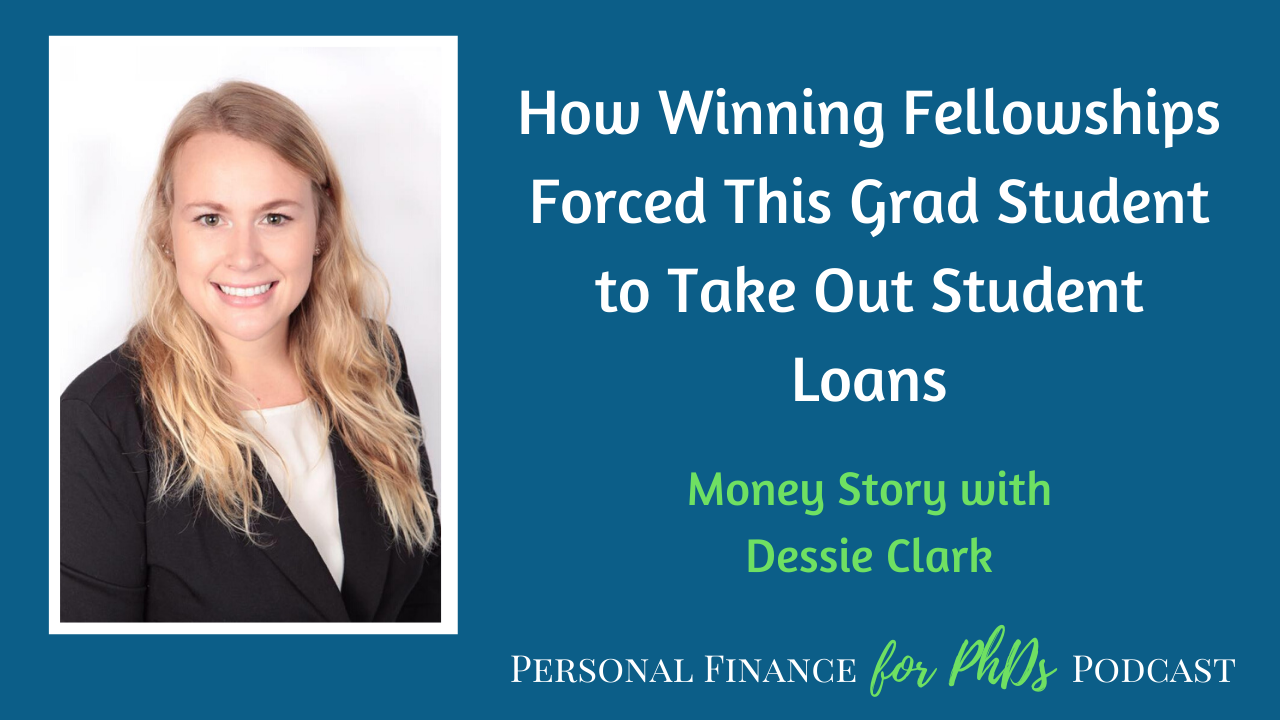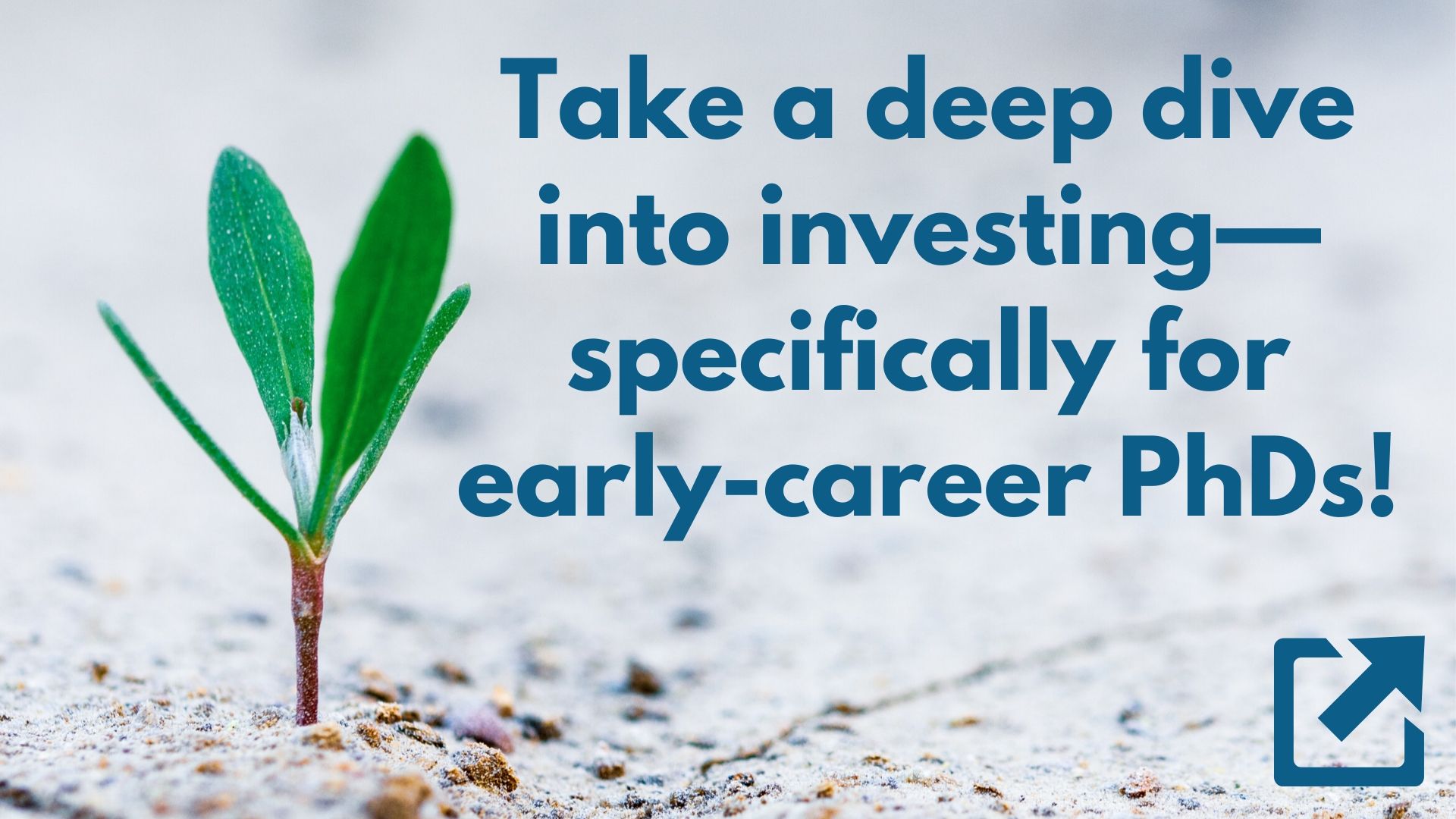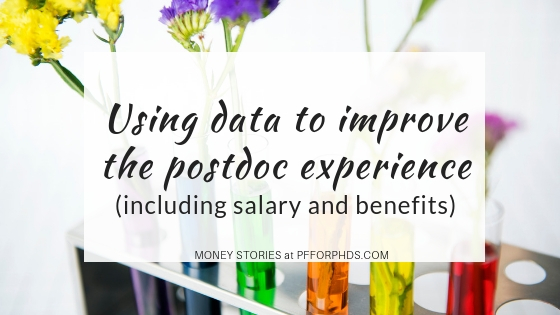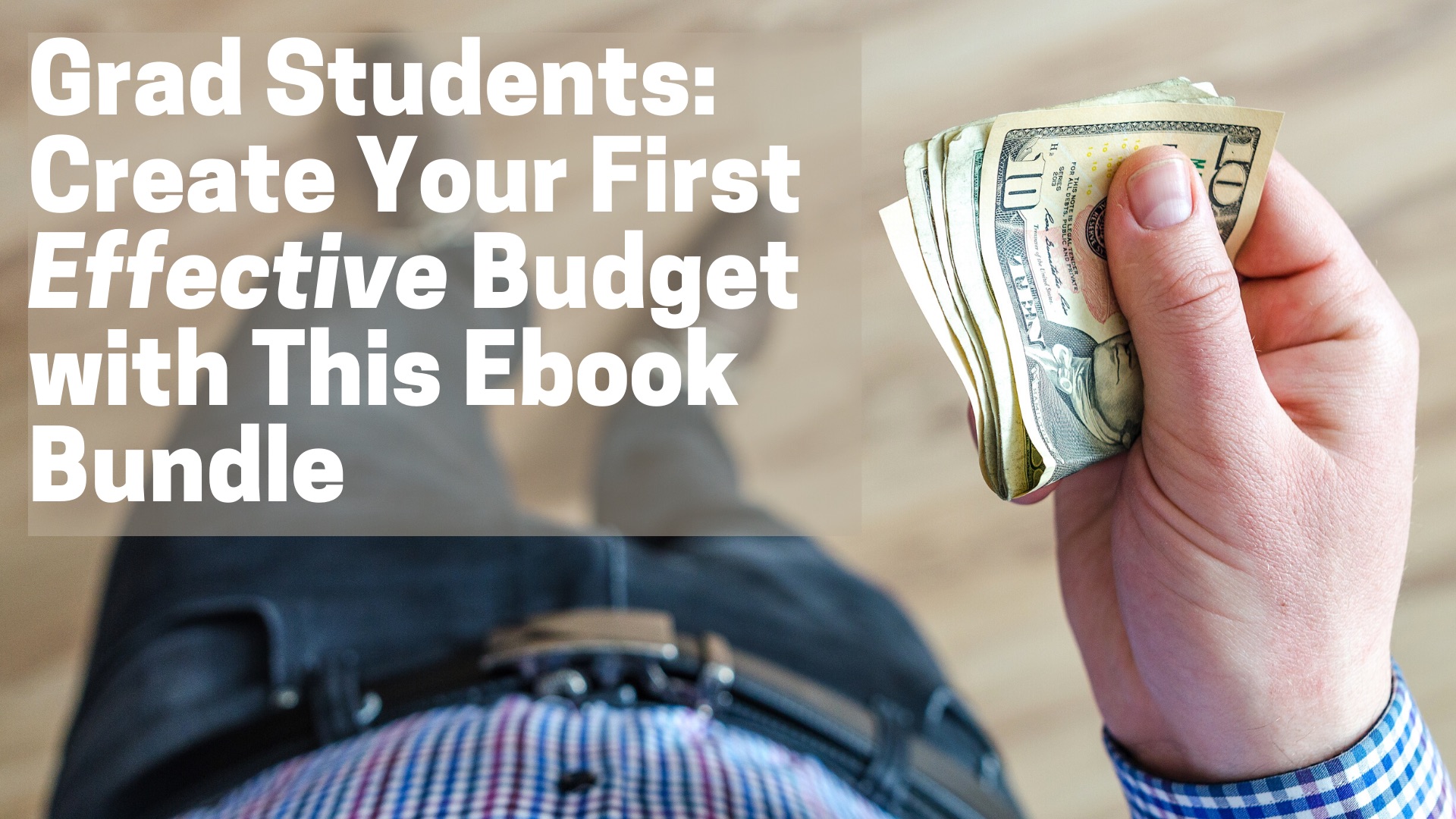In this episode, Emily interviews Dessie Clark, a doctoral candidate in Community Sustainability at Michigan State University. In 2018, Dessie received a few small fellowships for conference travel and a couple months of stipend income. In 2019, the financial aid office told her she had been “over-awarded” and had to pay the travel fellowship money back. Dessie took out student loans to pay that bill and then set up a payment plan with the IRS when she couldn’t pay the additional tax due on the fellowships. Dessie shares the steps she takes now when receiving fellowships so that she does not become over-awarded and how to prepare for tax time as a fellowship recipient.
Links Mentioned in This Episode
- Find Dessie Clark on Twitter and on her website
- Personal Finance for PhDs: Tax Hub
- Personal Finance for PhDs: Podcast Hub
- Personal Finance for PhDs: Subscribe to the mailing list
- The Complete Guide to Quarterly Estimated Tax for Fellowship Recipients
- Workshop: Quarterly Estimated Tax for Fellowship Recipients
Teaser
00:00 Dessie: Outside of academia, people wouldn’t hesitate to ask questions about their paycheck, right? And so we need to kind of be thinking about it the same way. If something was different on your paycheck, you would ask why or what’s going on and how you need to deal with it. So just not being afraid to try and talk to people about what’s going on with you so you don’t get in a bind.
Introduction
00:22 Emily: Welcome to the Personal Finance for PhDs podcast, higher education in personal finance. I’m your host, Dr. Emily Roberts. This is season five episode one and today my guest is Dessie Clark, a doctoral candidate and community sustainability at Michigan State University. In 2018, Dessie received several thousand dollars in fellowship income for travel awards and a couple months of stipend income. In 2019, she received a bill from the university for the amount of the travel awards. Apparently, she had become overawarded, a term that was totally new to me., Dessie he took out student loans to pay back the university, and to add insult to injury, faced a higher tax bill that season as well. Dessie relays what she had learned on how to avoid becoming over awarded and her advice for all graduate students receiving stipends. Without further ado, here’s my interview with Dessie Clark.
Will You Please Introduce Yourself Further?
01:19 Emily: I have joining me on the podcast today Dessie Clark, who is a graduate student and is going to be telling us about being awarded fellowships as a graduate student and some of the unexpected downsides that can come with being awarded fellowships, which is of course a wonderful thing, but in Dessie’s case they caused a few other complications. Dessie, thank you so much for joining us on the podcast today and will you please tell us a little bit about yourself?
01:45 Dessie: My name is Dessie Clark and I am a doctoral candidate in community sustainability at Michigan State University. I actually got my master’s degree at Vanderbilt University in community development and action. And then I moved to Michigan to finish out my PhD.
02:01 Emily: Great. And how long have you been at Michigan State?
02:04 Dessie: I have been at Michigan State for four years.
02:09 Emily: Okay. So I won’t ask you when you’re finishing, but I’ll just say soon, you’re finishing soon.
02:13 Dessie: Yeah, hopefully this year, maybe next year, maybe, you know, whenever.
Funding During the PhD:
02:16 Emily: Yeah. So can you tell us a bit how your funding has worked since you’ve been doing your PhD?
02:22 Dessie: I’ve mostly been funded as a research assistant, so that provides coverage for tuition and then a stipend to live on. There have been a couple of summers where I’ve taught as an instructor, but for the most part it’s been RAs. And then there have been some brief moments in time where fellowships have also come into play, which is what I wanted to talk about today.
02:43 Emily: Yeah. Please elaborate about that. When did you win fellowships and maybe what amounts were they, those kinds of details?
02:52 Dessie: I think one of the things that’s important is that I didn’t necessarily know that I was getting fellowships. How this came into play for me was I had friends that had gotten fellowships and they had talked about how they were unaware of the tax implications. So I knew when I was going to apply for fellowships or asked for them that there would be tax implications there. But for me, I was actually receiving fellowships in the form of travel awards. So there were multiple times where I applied to go to conferences, and when I was awarded that travel money, I wasn’t aware that they were fellowships. So I’ve won I guess, fellowships of several thousand dollars for travel. Then there was a brief time where, I needed to change labs and so fellowships were used to fund me in my transition.
03:40 Emily: Okay. So definitely for the travel awards, we’re only talking about thousand, few thousand dollars here and there. Seemingly a relatively small amount of money, right? And then when you were switching labs, was it a semester’s worth of funding or how long was that?
03:54 Dessie: It was still relatively small. It was a couple of thousand dollars, but all of these fellowships awards actually happened in the same semester, so by the end it ended up being like $7,000 or $8,000.
04:07 Emily: Oh, okay. When they hit all at once, it really does add up in that case. Okay. So yeah, you didn’t really know that that was what you were receiving. So what happened? You get this money and it’s all good, right?
04:19 Dessie: Right. So I get this money and I’m really excited, I can afford to go to these conferences, I’m able to switch labs. But one of the things that I didn’t know is that they were fellowships, so I was kind of surprised two-fold. The first thing that happened that let me know that something wasn’t going quite right was that — this was in the fall of 2018 — so when I was going to start school in spring 2019, I got a bill from the university that said, “you owe us money, you’ve been over awarded.” I had no idea what that meant, but what I understand now is that every student has a cap on what they’re allowed to receive for education-related expenses. They had decided that this amount of money that I had received for travel had thrown me over that, so I needed to pay back university. That was kind of the first thing I noticed.
Fellowship Cap and Being Over-awarded
05:05 Emily: Let me pause there, because this term over awarded is new to me as well. What are you paying back to the university?
05:16 Dessie: What they were charging me ended up being the sum total of those travel award costs. There’s something that you can do to kind of help with this. Like I said, every student has a cap for how much money they’re allowed to receive, but one of the things that your department can do is they can write a letter saying, “This travel money is necessary for this person’s education. This is advancing their education or contributing in some way and this money is going towards that. It’s nothing extra. It’s not something we can go shopping on. This is money for the students’ education.” I didn’t know that that was something that could be done or needed to be done, so it wasn’t done in my case. I got this bill and it happened to be for the exact amount that I had received for travel awards. I found out through talking to financial aid that basically those things have been passed through as fellowships and because of how they were categorized, I got more money from the university than I was allowed to and so I needed to pay it back.
06:12 Emily: So it sounds like your stipend had been paid by your RA position and this supplemental fellowship, but those were kind of evening out to be what you’re allowed to be paid. And then these travel awards were over and above that and they were like, you’re not allowed to receive this money. This is literally the first time I’ve heard of this. I don’t know if maybe this is unique to your university or your department or maybe in all these cases, other people write these letters, their advisors write these letters that you’re talking about. I’m not sure how that works out, but this is really the first time I’m hearing about this, so it’s definitely raising like some major red flags for me.
06:46 Dessie: Yes. So from my understanding, and this is just what I’ve been told, this kind of cap exists for every student that is at a university, but I don’t know if it’s just how my university chose to handle it, or if this is happening a lot more than people know about, but basically what happened was I was over whatever that cap is. So it became a huge issue because now I’m sitting here before I can start school being told that I was thousands of dollars.
07:15 Emily: Right, exactly. So what did you do?
07:19 Dessie: What I did was what I didn’t want to do, I took out student loans and they subtract it from that.
07:24 Emily: So you took out student loans to pay the university for money that you had won that you used go to conferences. This Is bananas. This situation makes no sense. I’m really glad that you volunteered to come on the podcast to talk about this because the situation I’ve heard in the past for other students is that maybe they have a fellowship coming from the university or maybe they have an RA position or TA, something like that. Then they win a fellowship that’ll pay like their stipend. And a lot of students think, “I am in the money now.” They think getting that fellowship on top of the existing funding for their RA position or whatever it was. That is almost universally not the case. It is possible that you may end up being paid more than you were going to in the first place, but it’s not going to be double what your stipend was to begin with. And so there’s plenty of people who are caught by surprise by “what I just won funding, what do you mean you just take away my other funding?” No, that’s definitely how that works everywhere. There may be some room for negotiation and so forth, but that’s how the standard situation works. But I’m really glad to hear about your situation as well. So you know, now that you have been through the whole thing, what could have been done on your behalf and wasn’t. I don’t know. This is something that I’ve never heard of, of a student having a proactively ask for, so of course you wouldn’t have known, but I guess in the future, anyone listening who receives extra fellowships in some manner, make sure that you’re not going to run into any kind of cap, or whatever exceptions need to be made are going to be made on your behalf. Is that your advice?
Proactive Steps to Avoid Getting Over-awarded
08:54 Dessie: Yes, that is definitely my advice. I think something else too that really ties into this, that I experienced, is I got another fellowship for travel in spring and of course this time I was like, “hi, can you please write this letter and send it to financial aid? “And they were able to do that. But I came upon a situation this summer where there was something the university was going to pay for and they weren’t able to pay for it the way that they want it to. I had gone to my college and I said, I need help figuring out how this thing is going to get paid for, but it can’t be a fellowship because I’m scared I’m going to get over awarded again and I’m going to owe it. My college was really great at hearing that concern and trying to work with me on it, but what ended up happening in the meantime is that the graduate school at my university granted it as a fellowship anyway. One of the things that I think is a kind of a broader issue is that when we’re getting loans or we’re getting grants, we have to accept them and there’s usually some paperwork that we have to go through promising whatever and making sure we fully understand the impacts, but I was awarded a fellowship without my permission basically. I think that the school has figured it out, so that way I won’t be over awarded and this won’t impact me, but I also think that’s why I said at the beginning, it’s really important to know how things are being classified and categorized on your behalf because maybe something is a fix, but then all of a sudden six months down the road you’re being asked to pay it back. I think keeping an eye on that is really important.
10:15 Emily: Yeah. I mean, it sounds like you were taking the proactive steps the second time around that you knew to take, and yet, as you just said, they can just push these things through into your student account and there’s no process around it. It’s totally on their end and they have control over it. But I guess, did it just end up being that they just took it back like, “Oh, we gave it to you, now we’re going to take it back and award you the money in some other way?”
10:40 Dessie: They ended up just doing what I was talking about before and doing the right amount of paperwork to explain why this is an educational expense and all of that. I think it was handled because they knew that there were some extra steps that needed to be taken. But I think another thing too is you asked me how I found out about all this. Like so many other students at tax time, it really became a “you owe this money.” I think too, it’s easy for us to just think like, well this was only, you know, $1,000 here or $1,000 there. But it really adds up. And for most graduate students, we’re not in a super comfortable financial place. So even a surprise tax of a couple of hundred dollars can really set you back.
11:20 Emily: Yeah, and sometimes I think it’s easy to forget the academic year and the calendar year don’t line up, right? So you could be receiving fellowships maybe in two different academic years, but if they fall in the same calendar year, then it’s all going to add up at that year-end tax return.
Commercial
11:40 Emily: Emily here for a brief interlude. Tax season is upon us and while no one loves this time of year, it’s particularly difficult for post-bac fellows, funded grad students, and postdoc fellows. Even professional tax preparers are often thrown for a loop by our unique tax situation. And don’t get me started on tax software. I provide tons of support at this time of year for PhD trainees preparing their tax returns. From free articles and videos, to paid at-your-own-pace workshops, to live seminars and webinars for universities and research institutes. The best place to go to check out all of this material is pfforphds.com/tax that’s P F F O R P H D dot com slash T A X. Don’t struggle through tax season on your own. Visit my website for the exact information you need in the most efficient form available. Now back to the interview.
Tax Consequences of Being Over-awarded
12:44 Emily: Okay, not only did you, you know — Hey, you received award funding. Awesome. Got that. Oh no, you have to pay it back to the school. Ridiculous. You have to take out student loans, do that. So essentially, with some middlemen, you were just taking out student loans to go to conferences, which is probably not a decision, it sounds like, you would have made, had you known that was going to be outcome. On top of that, travel and research is not a qualified education expense for making fellowships tax free. So you end up with this tax bill on top of all the other stuff that’s happening. How did that play out?
13:19 Dessie: I think one of the things that I knew when I was changing labs is that I knew that a portion of that fellowship money, I knew it was untaxed* and I was gonna need it. So I was able to put that aside. What surprised me is when I sat down with my accountant and she put two and two together, that all these other things had been categorized as fellowships, the amount I had set aside to pay taxes on was not nearly the amount of money that I needed. That was obviously a huge strain. I’m lucky enough that I have a partner who works, but we did end up having to go on a payment plan to the IRS because I just couldn’t afford to come out of pocket the amount that I owed.
[* By ‘untaxed,’ Dessie is referring to the fact that income tax was not withheld for her on this portion of her income, not necessarily that it is tax-free.]
13:57 Emily: At the point when you were working with your tax preparer, at what point in tax season was that? Were you getting ready to file and you found out that, “Oh wait, I’m going to owe more than I had set aside?”
14:08 Dessie: It was right at the end. There was no fixing it. I getting ready to file taxes and she’s like, this is not looking good, and it was what it was at that point.
14:18 Emily: Not all the listeners may know, but some people might hear, maybe from their parents or something, about filing extensions. So they get another, I don’t know, six months or something to file your tax return. You do not get an extension on actually the tax that you owe. You only get the extension on the return. So if you’re finding out in March or April that you owe a tax bill and you’re not prepared to pay it, as you said, graduate students typically live without much margin in their lives. If you find that you owe a tax but you’re not prepared to pay it, really probably the best thing to do is what you did, which is to go on a payment plan with the IRS. A lot of people would say, “Oh my gosh, the IRS, I’m so afraid I don’t want to talk to them. I don’t want to deal with them,” but actually that’s the worst step you can take, is not to talk to them. Did the payment plan work out okay? Did it end up being all right that you could pay a little bit over time?
15:06 Dessie: I’m still on it to this day. I owed a chunk and there’s only so much I could put towards it per month. So yeah, it has worked out. I’m making my payments so I haven’t gotten in trouble with the IRS, but it isn’t a new bill now every month that I have to pay. I think too, just thinking about this calendar year and the implications for next tax season, I think now I’m just very closely watching anything financially that comes through the school just to make sure I don’t get into this situation again. I know now there are ways that your department or your college can help you, and making sure that these expenses are processed the way they should be as true education expenses and not as extra in your life. And just keeping an eye on that. I think especially as I get into the fall, I will definitely be following up with my administrators and saying, “Hey, just want to make sure I see this here. Was there something that went with this to make sure that I’m not getting a bill for being over-awarded again, or I’m not having any more tax implications than I already know I will have.”
Saving Money for Taxes When Your Fellowships Do Not Have Tax Withheld
16:08 Emily: Right. At this point, now that you’re so aware and you’re so proactive about everything, are you filing quarterly estimated tax or does your additional tax due not rise to that level of necessity?
16:22 Dessie: It doesn’t rise to that level, but I am always putting stuff aside. Even when there are things that should be categorized in a way that I won’t have to worry about that, I’m still always just taking a certain percentage and putting it aside, because I think in my situation, the worst case scenario is to have what happened this year and be totally surprised and unprepared, because that’s exactly what happened.
16:42 Emily: Can you tell the listeners a little bit about your system for setting money aside? Because maybe they want to know, mechanically, how you do that.
16:48 Dessie: Yeah. I am not an accountant so I don’t have this down to any kind of science. It’s just kind of what I’ve found has worked for me. So anytime that I get any kind of award through the school, whether it be for travel or whatever else, it could be research money, I always take about 30% of that and I put it in a savings account. And that seems to be kind of a pretty safe estimate of you definitely won’t need to pay more than that, and so I think that’s been my system now. Even when I make requests for money, I always keep that in mind, because I think something that I’ve watched other students go through is they ask for exactly what they need, forgetting about that tax buffer. And so you might end up short or paying back necessary money later.
17:33 Emily: Yeah, good idea. I do think 30% is a very good margin, probably more than you’ll need, but better to be on the safe side than on the sorry side, as you definitely found out. Do you have like a separate savings account that you use for that or something?
17:46 Dessie: Yes, I have a savings account that I just don’t touch. I kind of joke with my partner, that it’s like the savings account that you don’t use as a savings account. There is no level of emergency that could make me touch that money. I pretend it’s not there because for all intents and purposes, it’s not mine. It’s the government’s, and I don’t want to end up in a situation. I mean it’s August, right? And I’m still on a payment plan for this past year’s taxes. I don’t want to have to do that again.
18:12 Emily: Yeah, I do the exact same thing. When I was in graduate school, some years…Well, I guess it wasn’t in graduate school, but it was when I did my postbac, taxes weren’t being withheld. I had to pay quarterly estimated tax at that time. I started doing the exact same thing. I set up a separate savings account, I have it nicknamed tax, put money in there as I get money to come in, withdraw from it as I was paying quarterly estimated tax. But I wanted to say that I do the exact same thing as you, which is that I don’t think about that tax savings account as being my money. Right now, when I’m self employed, I also have the responsibility of paying quarterly estimated tax. And so I actually calculate my, or our family’s net worth every month, on the first of the month, and so I calculate two numbers, which is one my technical net worth, which includes the tax money in it, and then what I label as my true net worth, which subtracts that tax savings account balance out. And I say, “Nope, I don’t even think of it as being mine right now because, as you said, I know I just have to hand it over to the IRS in a few months.” I don’t want to think of it as accessible at all, in the meantime. So yeah, thanks for sharing about that.
Final Words of Advice
19:16 Emily: Is there any other final advice around the situation that you would want to tell someone else so they don’t get into the same kind of problems that you did?
19:24 Dessie: Yeah, just kind of recapping what I said. So I think, of course, the conversation that fellowships are untaxed* is just a broader conversation we need to be having in general because I don’t think a lot of people know that. But again, just monitoring how things are being processed for you and if they’re technically being categorized as a fellowship. Then, I think that for the most part students are pretty safe. I don’t want to create mass panic as far as this cap goes. If you’re just talking about you just have an RA or you know, just the little student loans or you just have a TA. I think where you start to get near this cap is when you’re doing a lot of research awards and travel awards and teaching where it’s on top of what you’re already getting. I think for students that might have multiple things going on, like I clearly had, making sure you’re having a conversation and knowing where that line is so that way you don’t cross it because the way that they balance their books is you’re not going to know until you’re far down the road and the money is already spent. It’s going to be the next semester. So just keeping an eye on that and honestly just reaching out and asking your financial aid office and saying “I know that there’s a certain amount of aid that we’re allowed to get. What is my number?” So you can kind of monitor it yourself because I really think that for most people, you’re better off saying, “No, I’m not going to take that award this semester. No, I’m not going to get this or do this now” and waiting, so you don’t cross that line and end up having the money need to be paid back.
[* By ‘untaxed,’ Dessie is referring to the fact that income tax was not withheld for her on this portion of her income, not necessarily that it is tax-free.]
20:44 Emily: Yeah. Or just be aware, as you were saying earlier, that these letters or whatever can be written so that the money goes on top. So it sounds like, at least your university, your department, it wouldn’t be like, oh, your advisor just wants to pay you more or someone wants to just like give you a fellowship. You’re going to run into problems with that. It has to be something that’s justifiable under their system for raising their cap on an exception basis to allow that award to go through.
21:10 Dessie: Right, and I think too, just noting that the people that work in financial aid may not be as familiar with why research money or why conference money is an educational expense. So things that you might see and go through and you think, “Oh yeah, that’s totally an expense for my education. Anyone would see that?” No, you might have to justify it and they might need, you know, justification from your department on why this is important for your education.
21:32 Emily: Yeah. And I will just add that financial aid professionals and so forth, they’re not going to touch this tax issue with you. They’re going tell you to go away if you try to ask them tax questions. But in the area of how much you’re supposed to be awarded and what the education expenses are, they are the experts in that area. So you can definitely go to them with those kinds of questions. Just don’t ask them, “what’s my tax bill going to be?” They’re not going to answer that. But, yeah, among that subject matter, they are the best people to go to, I think. It sounds like you’ve developed a little bit of a working relationship with those people.
22:04 Emily: Dessie, thank you so much for giving this interview and sharing the story. I think it’s really unfortunate how it worked out and also just that you were saying that you didn’t catch all of this until the following calendar year or the following semester, naturally. That’s how these things work. Of course you wouldn’t, but because it happened so late, it sounds like the proper paperwork couldn’t have been pushed through in the past. I just want to ask the concluding question that I ask of all my guests, which is what is your best financial advice for another graduate student or early career PhD?
22:34 Dessie: I think asking questions. I think that early and often you should ask questions about the money that you’re getting, where it’s coming from, how it’s classified, and just always not being afraid to shoot financial aid and message and say “Hey, this has come through. Is there anything I need to do with this?” Because I think everyone, us included, but also the financial aid folks would rather be proactive about dealing with a problem rather than getting the early spring email, which was “what is happening, I can’t pay you a couple of thousand dollars.” I think just always asking questions and not being scared to ask about how these things impact you. Outside of academia, people wouldn’t hesitate to ask questions about their paycheck, right? And so we need to kind of be thinking about the same way. If something was different on your paycheck, you would ask why or what’s going on and how you need to deal with it. So just not being afraid to try and talk to people about what’s going on with you so you don’t get in a bind.
23:28 Emily: Yeah, absolutely. And like you said earlier, you don’t have to accept a fellowship. It can just be pushed through. And likewise for some other people, they might not even really be aware of how they’re being paid. They’re just kind of receiving a paycheck and they don’t really know is it from an assistantship. I mean they would know if they were teaching your class, right? They know if it says teaching assistantship, but is it a fellowship, is it an RA, I don’t know. The roles, like what you actually do for each of those things, are pretty much the same. So you might not even be aware until you get a W2 at tax time or don’t get a W2 at tax time, what happened in the previous year. Then, if any adjustments need to have made, then it’s too late, right? Then the tax year has already ended. So totally want to underline that advice — know why you’re being paid, know what kind of tax forms you’re going to receive.
24:10 Emily: I just want to add in a final note for the listeners, if there’s anyone listening who is receiving a fellowship, even a small award, like what Dessie’s been talking about during this interview, you should look into whether or not you need to file quarterly estimated tax. I’m going to link in the show notes my massive article on quarterly estimated tax. And I also have a workshop on that that’s linked from that article. So I’ll link to both those things in the show notes. Please note that the deadlines for quarterly estimate tax are in mid April, mid June, mid September and mid January of every year, usually the 15th of the month or the business day following. So keep those deadlines in mind. If you are receiving a fellowship, you might not have to pay quarterly, but at least you need to investigate and figure out whether or not it’s your responsibility, or whether like what Dessie’s doing, you can just set the money aside and leave it until the end of the year and pay it all at once with your annual tax return.
25:01 Emily: Thank you again Dessie for coming on and giving this interview and giving this word of warning to all the other graduate students listening.
25:08 Dessie: Thank you for having me.
Outtro
25:10 Emily: Listeners, thank you for joining me for this episode. PFforPphDs.com/podcast is the hub for the Personal Finance for PhDs podcast. There, you can find links to all the episode show notes and a form to volunteer to be interviewed. I’d love for you to check it out and get more involved. If you’ve been enjoying the podcast, here are four ways you can help it grow. One, subscribe to the podcast and rate and review it on Apple podcast, Stitcher, or whatever platform you use. Two, share an episode you found particularly valuable on social media or with your PhD peers. Three, recommend me as a speaker to your university or association. My seminars covered the personal finance topics PhDs are most interested in, like investing, debt repayment, and taxes. Four, subscribe to my mailing list at PFforPhDs.com/subscribe. Through that list, you’ll keep up with all the new content and special opportunities for Personal Finance for PhDs. See you in the next episode, and remember, you don’t have to have a PhD to succeed with personal finance, but it helps. The music is Stages of Awakening by Podington Bear from the Free Music Archive and is shared under CC by NC. Podcast editing and show notes creation by Lourdes Bobbio.












